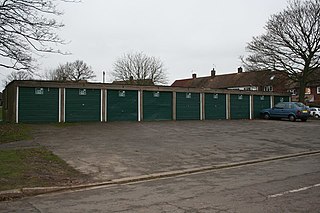In English law, a fee simple or fee simple absolute is an estate in land, a form of freehold ownership. A "fee" is a vested, inheritable, present possessory interest in land. A "fee simple" refers to a sub-category of such interests that features an absence of any temporal condition limiting its durational period under common law, whereas the highest possible form of ownership interest that can be held in real property is a "fee simple absolute," which is a sub-set characterized by an absence of limitations regarding the land's use. Allodial title is reserved to governments under a civil law structure. The rights of the fee-simple owner are limited by government powers of taxation, compulsory purchase, police power, and escheat, and may also be limited further by certain encumbrances or conditions in the deed, such as, for example, a condition that required the land to be used as a public park, with a reversion interest in the grantor if the condition fails; this is a fee simple conditional.
In common law and statutory law, a life estate is the ownership of immovable property for the duration of a person's life. In legal terms, it is an estate in real property that ends at death when ownership of the property may revert to the original owner, or it may pass to another person. The owner of a life estate is called a "life tenant".

A lease is a contractual arrangement calling for the user to pay the owner for use of an asset. Property, buildings and vehicles are common assets that are leased. Industrial or business equipment is also leased. Broadly put, a lease agreement is a contract between two parties: the lessor and the lessee. The lessor is the legal owner of the asset, while the lessee obtains the right to use the asset in return for regular rental payments. The lessee also agrees to abide by various conditions regarding their use of the property or equipment. For example, a person leasing a car may agree to the condition that the car will only be used for personal use.
A leasehold estate is an ownership of a temporary right to hold land or property in which a lessee or a tenant holds rights of real property by some form of title from a lessor or landlord. Although a tenant does hold rights to real property, a leasehold estate is typically considered personal property.
Overriding interest is an English land law concept. The general rule in registered conveyancing is that all interests and rights over a piece of land have to be written on the register entry for that land. Otherwise, when anyone buys that piece of land, the interests will not apply to the purchaser, and the rights will be lost. Overriding interests are the exception to this general rule. Overriding interests need not be registered to bind any new owner.
In common law jurisdictions such as England and Wales, Australia, Canada, and Ireland, a freehold is the common mode of ownership of real property, or land, and all immovable structures attached to such land. It is in contrast to a leasehold, in which the property reverts to the owner of the land after the lease period expires or otherwise lawfully terminates. For an estate to be a freehold, it must possess two qualities: immobility and ownership of it must be forever. If the time of ownership can be fixed and determined, it cannot be a freehold. It is "An estate in land held in fee simple, fee tail or for term of life."

Bruton v London and Quadrant Housing Trust[1999] UKHL 26 is an English land law case that examined the rights of a 'tenant' in a situation where the 'landlord', a charitable housing association had no authority to grant a tenancy, but in which the 'tenant' sought to enforce the duty to repair on the association implied under landlord and tenant statutes. The effect of the case is to create the relationship of de facto landlord and tenant between the parties.

Liverpool City Council v Irwin [1976] UKHL 1 is a leading English contract law case, concerning the basis on which courts may imply terms into contracts; in particular in relation to all types of tenancies, a term may be implied if required for a particular relationship, such as for the landlord to keep the stairwells clear in a tower block. The tenants also had a duty of reasonable care which some among them had been repeatedly breached and led to a continuing breach in matters of damage about which they complained so they were not entitled to withhold rent on the facts.

Street v Mountford[1985] UKHL 4 is an English land law case from the House of Lords. It set out principles to determine whether someone who occupied a property had a tenancy, or only a licence. This mattered for the purpose of statutory tenant rights to a reasonable rent, and had a wider significance as a lease had "proprietary" status and would bind third parties.

Littlewoods Mail Order Stores v Inland Revenue Commissioners [1969] 1 WLR 1241 is a UK company law case concerning piercing the corporate veil.

Errington v Wood[1951] EWCA Civ 2 is an English contract law and English land law judicial decision of the Court of Appeal concerning agreement and the right to specific performance of an assurance that is relied on.

English land law is the law of real property in England and Wales. Because of its heavy historical and social significance, land is usually seen as the most important part of English property law. Ownership of land has its roots in the feudal system established by William the Conqueror after 1066, and with a gradually diminishing aristocratic presence, now sees a large number of owners playing in an active market for real estate. The modern law's sources derive from the old courts of common law and equity, along with legislation such as the Law of Property Act 1925, the Settled Land Act 1925, the Land Charges Act 1972, the Trusts of Land and Appointment of Trustees Act 1996 and the Land Registration Act 2002. At its core, English land law involves the acquisition, content and priority of rights and obligations among people with interests in land. Having a property right in land, as opposed to a contractual or some other personal right, matters because it creates privileges over other people's claims, particularly if the land is sold on, the possessor goes insolvent, or when claiming various remedies, like specific performance, in court.

Kling v Keston Properties Ltd (1985) is an English land law case, concerning actual occupation in registered land, specifically domestic garages.

National Provincial Bank Ltd v Ainsworth [1965] is an English land law and family law case, concerning the quality of a person's interest in a home when people live together, as well as licenses in land.

Binions v Evans[1972] EWCA Civ 6 is an English land law and English trusts law case, concerning a constructive trust of land which will often be irrevocable whilst the occupier is in occupation as opposed to a licence to occupy — and/or a tenancy at will which is similar save that without transfer of the underlying property it can be revoked without cause. The case hinged on the fact there was an agreement specifying the existing occupier was to remain.

Mikeover Ltd v Brady [1989] is an English land law case, concerning the definition of leases, specifically a standard tenancy as opposed to a licence. Here a licence was confirmed and upheld where two former co-habitees had fallen out and separated; removing from the remaining licensee, in arrears, the extra time to remain afforded by the old Rent Act 1977 type tenancies which he hoped to benefit from.
Prudential Assurance Co Ltd v London Residuary Body [1991] UKHL 10 is an English land law case, confirming and explaining the requirements of certainty of duration of any lease.
Rent regulation in England and Wales is the part of English land law that creates rights and obligations for tenants and landlords. The main areas of regulation concern,

Solle v Butcher [1950] 1 KB 671 is an English contract law case, concerning the right to have a contract declared voidable in equity. Denning LJ reaffirmed a class of "equitable mistakes" in his judgment, which enabled a claimant to avoid a contract. Denning LJ said,
... a contract will be set aside if the mistake of the one party has been induced by a material misrepresentation of the other, even though it was not fraudulent or fundamental; or if one party, knowing that the other is mistaken about the terms of an offer, or the identity of the person by whom it is made, lets him remain under his delusion and concludes a contract on the mistaken terms instead of pointing out the mistake.... A contract is also liable in equity to be set aside if the parties were under a common misapprehension either as to facts or as to their relative and respective rights, provided that the misapprehension was fundamental and that the party seeking to set it aside was not himself at fault.

Land Transaction Tax (LTT) is a property tax in Wales. It replaced the Stamp Duty Land Tax from 1 April 2018. It became the first Welsh tax in almost 800 years.













